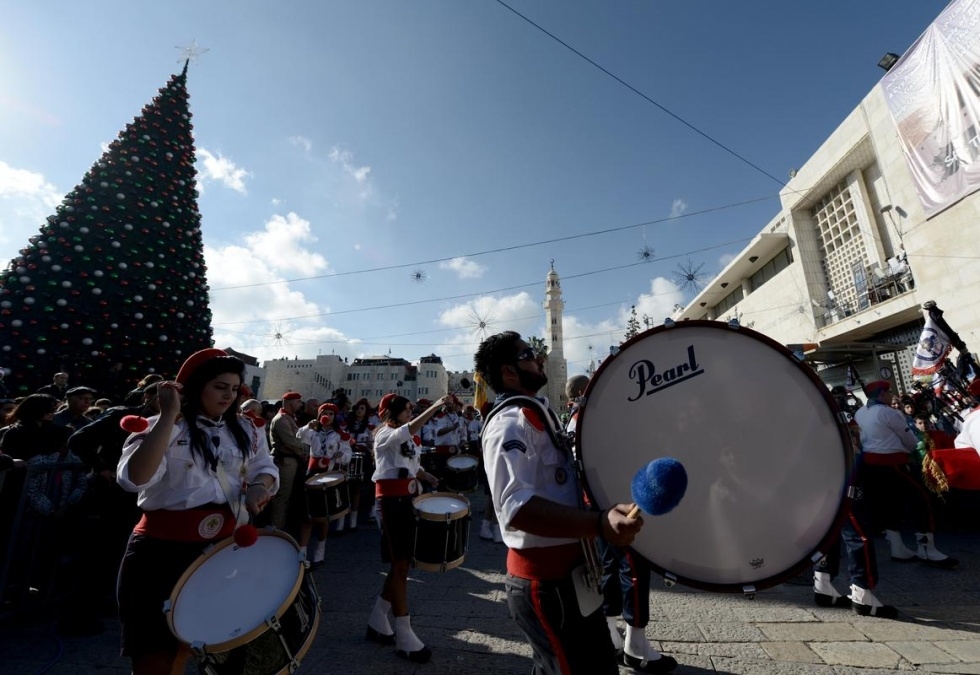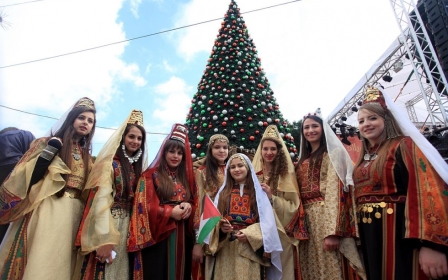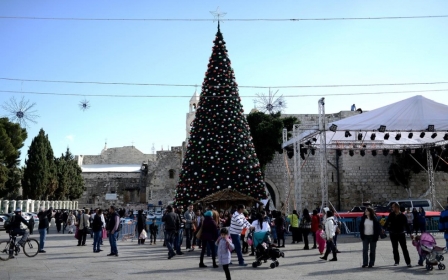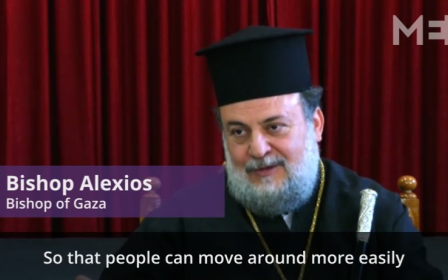Christmas in Bethlehem

The touch, taste, sights, sounds, and smells of Christmas in Bethlehem dazzle all senses and are meaningful, despite the difficult Israeli occupation. Inside the Church of Nativity, the smell of burning incense mixed with the smell of old wood and burning candles cast flickering shadows on ancient stones that echo hymns of religious services unchanged for millennia.
In the Manger Square, a beautifully decorated Christmas tree stands on one side, while another is decorated by stories of suffering and by spent tear gas canisters, stun grenades and spend ammunition used by the Israeli army on peaceful demonstrators who demand freedom.
In between, venders sell things ranging from souvenirs to steaming snacks and Arabic coffee. Christian decorations adorn centuries’ old buildings, overshadowing throngs of tourists from dozens of countries enjoying Christmas carols in many languages.
When we native Christian Palestinians have a few moments to meditate and reflect in this season, we reflect that some 2.5 billion human beings believe in a message that originated with a Palestinian baby born in a manger here. We reflect on the real message of Jesus, a
message of love and coexistence. The harsh reality on the ground reminds us of our responsibility to shape a better future. Bethlehem is home to 220,000 Palestinian Christians and Muslims including over 50,000 refugees. We natives are limited to develop in only 13 percent of our district, while over 100,000 colonial Jewish settlers live on stolen
Palestinian lands of the district.
Bethlehem is now isolated from its urban twin city, Jerusalem (5 miles from city centre to city centre) via an apartheid wall, unprecedented in our history, destroying the economy
for Palestinians on both sides of the wall. Israeli Jewish settlers move freely and have taken over most of our land and natural resources.
The main two sources of income for Palestinians in Bethlehem (Agriculture and Tourism) are mostly gone to the Jewish colonisers. We are now reduced to dependence on International humanitarian aid. Seven million of the 12 million Palestinians in the world are refugees or displaced people. The vast majority of Palestinians who remain are not allowed freedom of movement. I am not allowed into Jerusalem, even though I have an American passport, simply because I am a Palestinian Christian.
Bethlehem is still better than other places such as Gaza or Palestinian refugee camps in Lebanon and Syria. Gaza is 1.8 million Palestinians besieged in a semi-arid strip. 1.1 million of them are refugees who can look across the fake "border fence" and see their lands and many of their original destroyed villages. Places like "Sderot" and "Ashqelon" after all, were not empty lands before 1948 (see palestineremembered.com or Zochrot.org). The UN said Gaza is a humanitarian catastrophe and will be un-livable by 2020.
Despite all of this, we are still hopeful. Bethlehem is a UNESCO world heritage site and more people are discovering our suffering that has gone on for seven decades. We follow the footsteps of Jesus, the first Palestinian martyr of non-violent resistance.
We are hopeful because we take a long view of history. Some 150,000 years ago, humans migrated from Africa using Palestine as the passage way to Western Asia and then the rest of the world. 15,000 years ago, this area became the centre of development for agriculture (the Fertile Crescent). This was where we humans first domesticated animals like goats and donkeys and plants like wheat, barley, chickpeas, and lentils.
This transformation allowed our ancestors time to evolve what we now call “civilisation”. Hence, the first writings and the first thoughts of deities. Our Canaanite ancestors spoke a language we refer to now as proto-Aramaic. From this language and its first
alphabet came the Arabic, Syriac, and Hebrew languages and alphabets. Aramaic was the language of Jesus. Phoenician Canaanites evolved the Aramaic alphabet and delivered it to Europe and it became the alphabet you are reading now. A is from Aramaic Alpha (turn upside down to be the symbol of the bull; b from beit (house), turn to side to see a
domed house, J is from Jamal (became Camel, letter hump shaped) and so on.
For the 15,000 years of civilisation, there were thankfully very few attempts to transform Palestine from a mixed society of various religions and backgrounds to make it monolithic. Thankfully, these attempts lasted a tiny percentage of our long history and all failed. The latest attempt to make Palestine a Jewish state is failing though with significant bloodshed and copy-cat knockoffs like ISIS.
As we reflect this Christmas from Bethlehem, we aspire to a certain future when refugees
are allowed to return and all people of all religions live in equality and justice. Jerusalem/Bethlehem will then become a true light unto the world.
We are grateful that there has been tremendous growth of actions by civil society around the world to push for human rights and justice in this “Holy Land”. This has included some really significant actions for boycotts, divestments, and sanctions (BDS) from Israel in the same way we did with Apartheid South Africa.
So this Christmas we remember what Jesus said: “Blessed are they that mourn for they shall be comforted. Blessed are the meek for they shall inherit the earth. Blessed are they that hunger and thirst after righteousness for they shall be satisfied. Blessed are the merciful
for they shall obtain mercy. Blessed are the pure in heart for they shall see God. Blessed are the peacemakers for they shall be called sons of God. Blessed are they that have been persecuted for righteousness' sake for theirs is the kingdom of heaven,” (Luke 6).
History teaches us that injustice cannot last long, especially when so many people join the struggle. The thousands celebrating Christmas in Bethlehem give us hope. Merry Christmas everyone (and we do mean every human being on earth) and may 2015 bring us closer to peace with justice.
-Mazin Qumsiyeh is author of 'Sharing the Land of Canaan' and 'Popular Resistance in Palestine'. He is a professor at Bethlehem University and director of the Palestine Museum of Natural History.
The views expressed in this article belong to the author and do not necessarily reflect the editorial policy of Middle East Eye.
Photo: Marching band perform as Christian pilgrims visit the Church of the Nativity, believed to be the birthplace of Jesus Christ, on 24 December, 2014 in the biblical town of Bethlehem, West Bank (AA)
Stay informed with MEE's newsletters
Sign up to get the latest alerts, insights and analysis, starting with Turkey Unpacked
Middle East Eye delivers independent and unrivalled coverage and analysis of the Middle East, North Africa and beyond. To learn more about republishing this content and the associated fees, please fill out this form. More about MEE can be found here.





